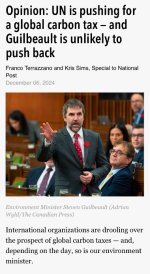“We are very supportive of the discussions that are happening at the International Marine Organization to put in place some kind of levy on international marine transportation,”
Steven Guilbeault said at this year’s United Nations climate conference in Baku, Azerbaijan.
Days later,
Guilbeault seemed to reverse course, tweeting that the “government has not supported any such international levy.”
Counterpoint: Environment minister responds to critics who suggest that pollution pricing will make Canadians worse off

apple.news
So which one is it? After hitting Canadians with a carbon tax on fuel, an industrial carbon tax and a de facto carbon tax buried in the
clean fuel regulations, has Guilbeault finally found a carbon tax he doesn’t love at first sight?
View attachment 26031
While Guilbeault is figuring that out, here’s what international organizations are saying.
Despite flip-flopping on the idea, it's hard to imagine our environment minister has ever seen a carbon tax he didn't like

apple.news
The United Nation’s International Marine Organization
wants “a maritime GHG emissions pricing mechanism.” Translation: a new carbon tax on everything shipped across the oceans, like the shoes, cars, clothes and appliances Canadians buy, or the wheat, energy and minerals Canadians sell abroad.
The International Monetary Fund (IMF) also
believes there’s an “urgent need for a global carbon tax on aviation and shipping.”
The irony of politicians flying around the world on the taxpayer dime and imposing a carbon tax on citizens when we fly appears lost on the IMF. Yet it is at least up front about the costs, noting a global carbon tax on aviation and shipping fuels would be “mostly passed through into flight ticket prices and shipped products.”
Polling suggests that one of the main criticisms of Trudeau’s Liberals is that they preach more than they listen

apple.news
This global carbon tax would cost the world’s taxpayers upwards of “$200 billion by 2035, which could make a substantial contribution to climate finance for developing economies,” according to IMF estimates.
In other words, your kids’ shoes and family vacations will be more expensive. Then the unelected and unaccountable bureaucrats at international organizations will dictate which country will receive your hard-earned money.
His refusal to balance priorities and reliance on government dictates rather than consumer choice make his dreams unrealistic

apple.news
A global carbon tax on international flights and shipping would cost Canada about 0.52 per cent of GDP by 2035, according to the IMF. That’s a
$23.6-billion cost to our economy.
This wouldn’t be the first time the Trudeau government has pushed carbon taxes on other countries. At the 2021 UN climate conference in Glasgow, the Trudeau government launched the Global Carbon Pricing Challenge (GCPC).
US says current climate rules are satisfactory, prompting condemnation from activists and vulnerable countries

apple.news
Its goal is to get “all countries to adopt carbon pricing as a central part of their climate strategies, toward a collective goal of covering 60 per cent of global emissions by 2030,” with the program’s
website noting that, “Carbon pricing is most effective when more countries adopt it.”
So far, Ottawa has spent
$1.7 million and only a
dozen other countries have signed onto the GCPC as “partners,” alongside the European Union.
Around
70 per cent of countries do not have a national carbon tax, according to World Bank data. Only
24 per cent of global emissions are covered by carbon taxes.
Canada couldn’t even convince the United States, the world’s
largest economy and our
largest trading partner, to impose a carbon tax.
“The (climate) community has largely moved into a different framework,”
said John Podesta, a long-time Democratic strategist, when asked in 2020 whether the Biden administration would impose a carbon tax.
Good luck convincing president-elect Donald Trump to impose one.
Other large-emitting countries — such as India, Russia and Brazil —
don’t have national carbon taxes. That leaves China. Assuming we can trust what China reports, its carbon tax is
78 per cent lower than Canada’s, despite emitting
1,800 per cent more.
Instead of trying to force-feed other countries carbon taxes, Canada could do more for the environment — and save taxpayers money — by ending its practice of flying a battalion of politicians and bureaucrats half-way around the world to attend expensive conferences.
At a minimum, Guilbeault may have an easier time figuring out where he stands on global carbon taxes if his thoughts weren’t drowned out by the sound of taxpayer-funded jet engines flying him to far-flung destinations all the time.
It’s not a carbon tax. It never was. It is a tax on carbon dioxide, a life-giving, life-enhancing element of the air we breathe. Carbon dioxide is the source and vital energy of all our Earth’s plant life — “the force that through the green fuse drives the flower” — in Dylan Thomas’ wonderful description of it.
Of course it's going to cost Canadians more than is rebated

apple.news









